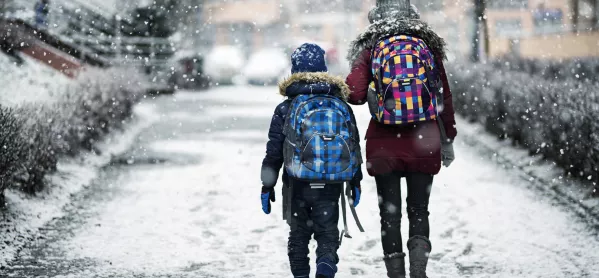Need to know: What Covid winter plan means for schools

Today, the government announced its plan to manage Covid over the winter months, making vaccines the first line of defence, supported by testing, public health advice and a new variant surveillance system.
When schools welcomed pupils back for the new academic year, many of the rules that had been in place to curb the spread of the virus had been relaxed: masks were no longer mandatory or recommended in classrooms or corridors - for staff or students - school-led contract tracing was over and “bubbles” had been wrapped up.
But students have still been expected to test twice on their return to the classroom and twice weekly thereafter, while schools were told to prepare for “stepping measures up and down”.
Covid: Schools hit with legal threats over on-site Covid jabs
Data: Covid rates rise among pupils as schools return
Warning: DfE told to prepare for high Covid rates in schools
Today’s plan outlines how the situation will change in the coming months, as ministers aim to minimise further restrictions, especially in the education sector.
So, what does the winter plan mean for schools?
Can the government still order school closures?
Not for long, if all goes to plan. The government intends to repeal a swathe of powers taken through the Coronavirus Act, including the right to “direct the temporary closure of educational institutions and providers“ in England.
But this change will have to go through Parliament first. The decision will be taken at the third six-month review of the Act, which is due before the end of September.
What if a school wants to close but the government disagrees?
Forcing schools to stay open is a power that ministers apparently wish to retain.
The plan states that the government wants to repeal “parts of Section 38/Schedule 17 of the Act”, which allows the education secretary to “disapply or modify existing requirements in education and childcare legislation“.
It clarifies that this will include “removing the ability to modify the duty on local authorities to secure the special educational needs provision in a child or young person’s education and health care plan“.
But there is no suggestion that other powers laid out in the section will be amended or repealed.
These include requiring a school to “open, to stay open, to reopen or to open at times when it would not usually be open“.
The plan says the government will review the legislation in the spring.
What’s happening with testing?
There was some confusion today over plans for regularly testing secondary students beyond the end of this month.
In its operational guidance for schools, last updated in August, the Department for Education (DfE) stated that students were expected to take two on-site lateral flow tests, three to five days apart, on their return in the autumn term.
After this, the DfE said they should “continue to test twice weekly at home until the end of September“, along with staff, when the guidance would be reviewed.
And the health secretary Sajid Javid corroborated this in the House of Commons today.
He told MPs he believed no final decision had been taken on whether schoolchildren without Covid symptoms would be required to undergo regular testing beyond September.
Conservative former minister Mark Harper said he understood there was to be a review at the end of the month on the issue, adding: “My view is we shouldn’t be regularly testing children who have no symptoms - only those who have symptoms.”
Mr Javid replied: “That is planned to continue for this month. Whether we continue beyond that, I’m not aware of a final decision that’s been made.”
He said the Department of Health and Social Care would be consulting with the DfE, adding: “If we continue with it, it must be supported by the evidence.”
But the winter plan states that, in secondary schools, the government “expects that testing for students will continue for the rest of this term“.
“This will be a valuable tool in minimising the overall disruption to education and is particularly helpful for this cohort, given its current lower level of vaccine-based protection,” it says.
Asked for clarification, the DHSC told Tes to refer to the winter plan, meaning it is expected that regular rapid-flow testing will continue for secondary students until the end of term rather than just to the end of the month.
You need a Tes subscription to read this article
Subscribe now to read this article and get other subscriber-only content:
- Unlimited access to all Tes magazine content
- Exclusive subscriber-only stories
- Award-winning email newsletters
Already a subscriber? Log in
You need a subscription to read this article
Subscribe now to read this article and get other subscriber-only content, including:
- Unlimited access to all Tes magazine content
- Exclusive subscriber-only stories
- Award-winning email newsletters
topics in this article



